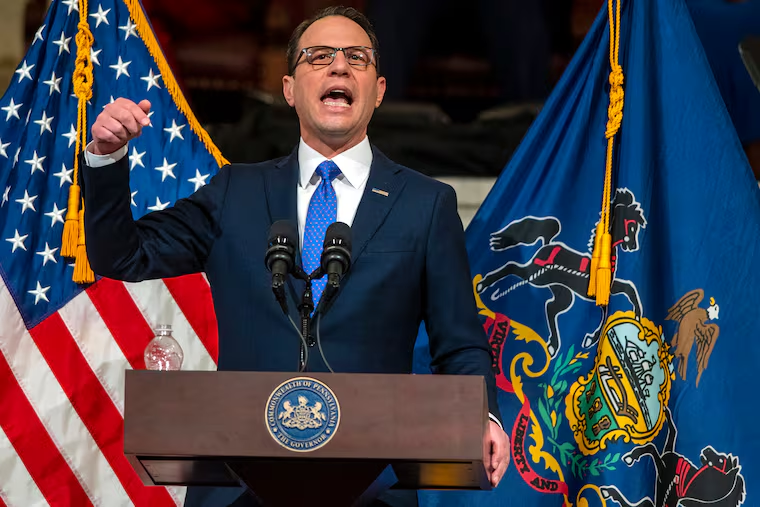Shapiro’s $18M plan would house youth on the grounds of a maximum-security men’s prison
Youth advocates have derided the proposal, which comes amid ongoing litigation over the state's failure to alleviate critical overcrowding in Philadelphia's youth detention center.

The State Correctional Institution Phoenix, in a bucolic corner of Montgomery County, is a maximum-security men’s prison.
But a 48-bed unit on the grounds of the Phoenix complex could also soon house boys as young as 13.
Gov. Josh Shapiro’s budget proposal, first outlined Feb. 6, identified $18.1 million in funding to build out a facility for youth who’ve been found delinquent — but did not specify that it would be at a state prison. A spokesperson for Pennsylvania’s Department of Human Services (DHS), which oversees youth facilities, acknowledged that it would be at Phoenix, but emphasized that it would be “outside the secure perimeter.”
“This new center will be secure and safe for both juveniles and workers, provide education and treatment for adjudicated youth, and it is completely separate from SCI Phoenix,” spokesperson Brandon Cwalina said in a statement.
The Youth Development Center, which would open in July, aims to address a shortage in beds at state facilities that has contributed to dangerous crowding at Philadelphia’s juvenile jail. In 2022, the city sued DHS over its failure to accept teenagers sentenced to placement fast enough, creating a backlog that left kids sleeping on floors.
» READ MORE: Shocking photos show kids sleeping on the floor in the city's juvenile detention center
But advocates said building a juvenile center alongside an adult prison is the wrong solution.
“Too many youth are being funneled into the system. It’s harmful and the research shows the harms they experience when they’re in adult facilities,” said Malik Pickett, senior attorney at the Juvenile Law Center. “It’s more money being spent to expand the system when we need to be looking into alternatives.”
A recent study, published in the Journal of Adolescent Health, found lasting mental-health impact for youth held in adult facilities. Other research has linked youth detention with worse educational and employment outcomes, and increased recidivism.
Philadelphia has reduced the number of young people it sends to placements by about 85% over the last decade. Yet, the number of facilities where young people can be sent has also declined precipitously, for reasons including staffing shortages, spiking insurance costs, and facility closures in the wake of abuse scandals.
» READ MORE: Why space shortages are on the rise even as fewer kids are locked up
Currently, there are about 200 young people in the city’s West Philadelphia detention center, which is licensed to hold up to 184 youth aged 10 to 17, who are awaiting trial or placement in a state-run facility.
The facility at SCI Phoenix could help move sentenced youth into placements faster. That’s to their benefit, since they don’t receive credit for time served in the city jail. Shapiro also proposed $2.5 million in education funding for youth housed there.
City officials expressed support for state efforts to develop new residential programs. Previous proposals by the state have included sending youth to a facility in Texas, which drew objections from Philadelphia’s public defender and others.
But groups that work with justice-involved teens argue that any investment in high-security youth facilities, rather than community-based resources, is counterproductive.
“It shows what we prioritize,” said Kendra Van de Water, executive director of YEAH Philly, a West-Philadelphia based organization that works with young people in the justice system. “Education in general in the city is not funded, and yet we find any way to fund prisons and jails.”
She said the city needs to step up, too — to address the conditions at its juvenile center, where she said kids still aren’t receiving adequate schooling, counseling, or medical care.
At one point last summer, there were 230 youth inside its detention center, leaving dozens sleeping in offices, gyms, or on the floors of cramped cells. Fights were breaking out, and some kids were building makeshift weapons, the city said in court filings.
Kate Parker, policy director at the Defender Association of Philadelphia, said the city and court should look to reduce reliance on time-committed sentences (sometimes forcing kids to stay years in a facility where the available treatment program may only last six or nine months), and invest in private placements and city-run programs.
“We need to ask ourselves why Philadelphia is using more than its share of allotted state placement beds,” she said, “even as the data tells us that young people are not being charged with a greater proportion of acts of violent crime.”